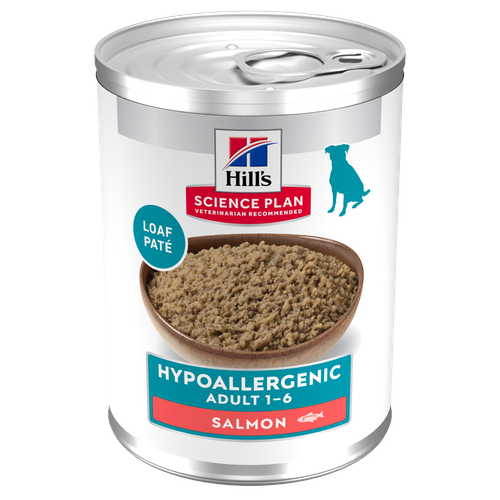
-
Find the right food for your petTake this quiz to see which food may be the best for your furry friend.Find the right food for your petTake this quiz to see which food may be the best for your furry friend.Featured products
 Mature Adult Dog Food
Mature Adult Dog FoodHill's Science Plan Mature Adult Multipack Wet Dog Food with Chicken & Beef are complete premium pet foods for mature adult dogs from 7 years. Your dog will love these deliciously smooth and savoury minced loaves, formulated to deliver the appropriate amount of energy to support the needs of adult dogs.
Shop Now Adult Wet Dog Food with Beef
Adult Wet Dog Food with BeefHill's Science Plan Adult Multipack Wet Dog Food with Chicken, Beef & Turkey are complete premium pet foods for adult dogs from 1 year. Your dog will love these deliciously smooth and savoury minced loaves, formulated for balanced nutrition and overall health.
Shop Now Puppy Food
Puppy FoodHill's Science Plan Puppy Multipack Wet Dog Food with Chicken & Beef are complete premium pet foods for growing puppies from weaning until 1 year old and for pregnant and nursing dogs. Your puppy will love these deliciously smooth and savoury minced loaves, formulated for balanced nutrition and overall health.
Shop NowFeatured products Mature Adult Wet Cat Food with Chicken
Mature Adult Wet Cat Food with Chicken
Tender chicken chunks in gravy for mature adult cats. Made with easy-to-digest ingredients, high-quality protein for lean muscle maintenance and antioxidant vitamins C+E for optimal health.
Shop Now Adult Multipack Wet Cat Food with Beef, Ocean Fish & Chicken
Adult Multipack Wet Cat Food with Beef, Ocean Fish & ChickenTender chunks in gravy for cats, with high-quality protein to maintain lean muscle. With vitamin E and omega-3s & -6s for healthy skin and balanced minerals to support healthy vital organs.
Shop Now Light Adult Multipack Wet Cat Food with Chicken & Ocean Fish
Light Adult Multipack Wet Cat Food with Chicken & Ocean FishTender chicken chunks in gravy for cats, with L-carnitine and fewer calories for ideal weight management. Packed with high-quality protein, omega-6s, and vitamin E for shiny fur and healthy skin.
Shop Now -
Dog
- Dog Tips & Articles
-
Health Category
- Weight
- Food & Environmental Sensitivities
- Urinary
- Digestive
- Joint
- Kidney
-
Life Stage
- Puppy Nutrition
- Adult Nutrition
- Senior Nutrition
Cat- Cat Tips & Articles
-
Health Category
- Weight
- Skin & Food Sensitivities
- Urinary
- Digestive
- Kidney
-
Life Stage
- Kitten Nutrition
- Adult Nutrition
Featured articles The Incredible Science Behind Your Pet's Microbiome
The Incredible Science Behind Your Pet's MicrobiomeLearn what your pet's microbiome is, how it contributes to your pet's gut and overall health, and why nutrition is important in maintaining healthy microbiomes.
Read More Show some love with wet foods: a great choice for pets with health issues
Show some love with wet foods: a great choice for pets with health issuesShow some love with wet foods: a great choice for pets with health issues.
Read More The Right Diet For Your Pet
The Right Diet For Your PetIn people, the right diet is very important. If you are eating the wrong way for your metabolism, activity level, age and lifestyle you could end up with health issues.
Read More -


Can dogs eat watermelon? It's a delicious summer treat for us, but is watermelon safe for dogs? If you enjoy this juicy treat but you fear it might not be good for your pooch, your instincts are partially correct. Watermelon can actually be a healthy dog treat — if it's fed to them correctly.
Can Dogs Eat Watermelon?
 The fleshy pink centre of a watermelon is loaded with healthy nutrients that are as beneficial for humans as they are for our canine companions.
The fleshy pink centre of a watermelon is loaded with healthy nutrients that are as beneficial for humans as they are for our canine companions.
Watermelon has no cholesterol and almost no sodium or fat. According to the PDSA, it’s a good source of potassium, vitamin C, vitamin A and vitamin B6. It also high in fibre to support healthy digestion, and its high water content (92%) keeps dogs cool and hydrated too – perfect for a sweet summer treat! Watermelon is high in sugar but doesn't cause unhealthy spikes in blood sugar, as its fiber content helps dogs absorb the sugar slowly into their bloodstream.
Is Watermelon Safe for Dogs?
The flesh of a watermelon is safe and nutritious for dogs, but eating too much could give your dog an upset tummy. Watermelon also contains sugar, although the high water content means it shouldn’t cause any unhealthy blood sugar spikes.


Tasty Tips
It’s best if your dog enjoys watermelon as a small snack or occasional treat!
What about seeds and rind? The Battersea Dogs Home warns that the other parts of the fruit can be dangerous for your pooch. They say that watermelon seeds can’t be properly digested by dogs, which can cause intestinal blockages in our canine friends.
While a seed or two is unlikely to cause health problems for large dogs, it doesn't take many of them to cause a blockage in small dogs.
Not only is this painful for your dog, but it could become serious enough to require surgery. It's also unwise to give your dog the hard, green outer skin of a watermelon, also known as the rind. This can also cause blockages, or give your dog gastrointestinal distress that leads to vomiting or diarrhoea.
How to Feed Your Dog Watermelon (and What to Avoid)
 So how should you share this treat with your canine companion? Here are a few guidelines to follow when feeding watermelon to your dog:
So how should you share this treat with your canine companion? Here are a few guidelines to follow when feeding watermelon to your dog:
- Only give your dog seedless watermelon or pieces of watermelon from which you've removed all of the seeds.
- Scoop out the fruit with a melon baller or cut it into small bites, being careful to remove any part of the rind.
- Only give your dog real watermelon. Artificially flavoured watermelon treats or sweets might contain other ingredients, added sugars or artificial sweeteners that could harm your pup.
Treats of any kind should make up no more than 10% of your dog's daily calorie intake, according to recommendations from The Dogs Trust. Whatever the size of your dog, follow this rule when determining how much watermelon you should feed them, keeping in mind that a 100g serving of watermelon contains about 30 calories. Even though your dog might be looking up at you with those big puppy-dog eyes, remember that they’re perfectly content eating their usual dog food day-in and day-out. So, while you might be tempted to give in and share a treat every now and then, your dog is better off getting their nutrients from their everyday pet food.
Before feeding your dog any human food, make sure to double-check with your vet to make sure it’s okay. While watermelon can be a healthy treat for many dogs, it's best to confirm that it won't negatively affect your dog's unique digestive system
So the next time you're at a picnic, you can happily share a few bites of seedless watermelon with your dog. As long as it's given safely and in moderation, watermelon as a dog treat is hard to beat.


Jean Marie Bauhaus is a pet parent, pet blogger, and novelist from Tulsa, Oklahoma, where she usually writes under the supervision of a lapful of fur babies.
Related products

Hill's Science Plan Puppy Multipack Wet Dog Food with Chicken & Beef are complete premium pet foods for growing puppies from weaning until 1 year old and for pregnant and nursing dogs. Your puppy will love these deliciously smooth and savoury minced loaves, formulated for balanced nutrition and overall health.

Hill's Science Plan Hypoallergenic Adult Wet Dog Food with Salmon is a complete premium pet food for all adult dogs from 1 year. This savoury tinned loaf is specially formulated for dogs with delicate skin and stomachs. It features a single novel animal protein source and is grain-free.

Hill's Science Plan Mature Adult Multipack Wet Dog Food with Chicken & Beef are complete premium pet foods for mature adult dogs from 7 years. Your dog will love these deliciously smooth and savoury minced loaves, formulated to deliver the appropriate amount of energy to support the needs of adult dogs.

Hill's Science Plan Adult Multipack Wet Dog Food with Chicken, Beef & Turkey are complete premium pet foods for adult dogs from 1 year. Your dog will love these deliciously smooth and savoury minced loaves, formulated for balanced nutrition and overall health.
Related articles

Learn effective tips for feeding a dog that's a picky eater and ensure proper nutrition for a finicky eater. Discover tips for pet parents at Hill's Pet UK.

How, when and what to feed your new puppy is an important decision, learn more about the things to consider for feeding your puppy.

Many human foods are dangerous to dogs. Read about 5 of the worst toxic food offenders that can kill your dog - and how much it takes to hurt them.

Learn about the potential health risks of a raw diet for dogs and why they aren't the best option for your pup or you.

Put your dog on a diet without them knowing
Our low calorie formula helps you control your dog's weight. It's packed with high-quality protein for building lean muscles, and made with purposeful ingredients for a flavourful, nutritious meal. Clinically proven antioxidants, Vitamin C+E, help promote a healthy immune system.
Put your dog on a diet without them knowing
Our low calorie formula helps you control your dog's weight. It's packed with high-quality protein for building lean muscles, and made with purposeful ingredients for a flavourful, nutritious meal. Clinically proven antioxidants, Vitamin C+E, help promote a healthy immune system.

